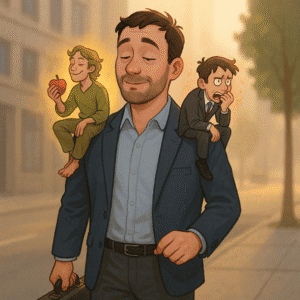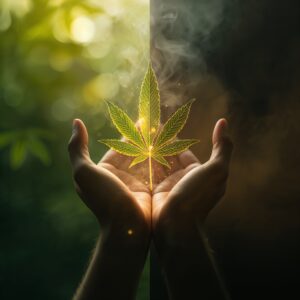People say weed is not addictive, is this true though? There is a big difference between something that is addictive and another that makes you dependent on it. In this lies the true debate on the subject. Obviously, there is a science to it which we can understand. Although we do not rely on it as a solid pillar of information as we are all vastly different from one another.
What exactly is addiction

According to the National Institute on Drug Abuse (NIDA) Addiction is a chronic, relapsing disorder characterized by compulsive drug seeking and use despite harmful consequences.
Chronic: It doesn’t go away overnight — it’s long-term and can resurface after periods of abstinence.
Relapsing: People may quit successfully for a while but return to use later.
Compulsive use: The person feels driven to use, even when they consciously don’t want to.
Harmful consequences: They keep using despite knowing it’s hurting their health, relationships, or work.
What we all commonly think of addiction: An action or consumable that overtime becomes nearly impossible to stop because rewards reaped by it no matter the consequences.
Common addictive substances/tools: Nicotine, alcohol, TV, social media, methamphetamines, sugar, caffeine. These are all your major culprits that 99% of humankind has an addiction to at least one of them.
Definition of dependency

Dependence is when the body and brain adapt to regular exposure to a substance, leading to tolerance and withdrawal.
Your system gets used to having the substance around, so it needs more of it to feel the same effect (tolerance) and reacts negatively when it’s taken away (withdrawal).
Tolerance: Over time, the same dose doesn’t hit as hard. The brain reduces its own natural production of certain neurotransmitters (like dopamine or anandamide), expecting cannabis to “fill in.”
Withdrawal: When you stop or reduce use, you might feel mild irritability, restlessness, sleep disturbances, appetite loss, or low mood for a few days.
Reversibility: Dependence can fade after a break; the body usually resets once balance returns.
In our own words: A substance or action that slowly replaces our own natural ability to produce the same effect. In result we need more and more to replace the effect & if removed from our cycle, we suffer with mild – aggressive withdrawals.
What is the difference Between the two

Addiction is harder to remove, and cravings can return at random. Dependency is more of a feeling, not a drive, addiction takes the wheel while dependency just makes suggestion as passenger driver. Addiction ruins most of your life (relationships, health, work) while dependency doesn’t have such a broad effect. You can often be dependent on a substance or action & still live a regular life.
Addiction is highly noticeable; it changes a great many of your characteristics, routines and beliefs.
Dependency works as a crutch; often replacing something that might have felt missing in your life at a time or helping to increase a part of your lifestyle (sleep, work, exercise).
Many dependencies also have side effects like addiction, yet they are often more subtle and less life threatening. This is where cannabis fits in.
Where does cannabis fit in

Cannabis sits in an unusual middle ground between habit, dependence, and (in some cases) addiction, yet it doesn’t behave like most addictive substances. It rarely hijacks the brain in the same way nicotine or alcohol do, while it can become something the mind leans on for comfort, focus, or relief.
Cannabis interacts with your body’s endocannabinoid system (ECS), a natural network of receptors that regulate things like mood, sleep, appetite, and pain. When you consume THC regularly, your body slowly adjusts, producing fewer of its own cannabinoids and relying on the external supply. That’s what leads to dependence, not necessarily addiction.
For most people, cannabis use looks more like psychological attachment than chemical enslavement. You might start using it to unwind after work, to help you sleep, or to ease stress, and before long, it becomes part of your daily rhythm. It’s not ruining your life, but it’s also not fully under conscious choice anymore.
The line between healthy use and dependency is often invisible until you try to stop. If taking a break causes irritability, sleepless nights, or constant thoughts of lighting up again, that’s dependence talking. But if you’re sacrificing goals, motivation, or relationships to keep using, that’s addiction starting to whisper.
Speaking From Experience

After more than a decade of on-and-off use, I’ve come to see cannabis as both a teacher and a test. It has offered solutions to stress, sleeplessness, and overthinking, yet it’s also exposed blind spots I didn’t know existed. The good moments can feel profound, even transformative. The bad ones? They quietly reshape how you see the world and how you see yourself.
I don’t write this as advice; life doesn’t fit neatly into someone else’s lessons. What helped me might do nothing for you, or even the opposite. Every person’s relationship with cannabis is uniquely wired to their own circumstances, mindset, and timing.
The Beginning

The first encounter with cannabis is often unforgettable. If the dose and environment are right, it can be euphoric, calming, even eye-opening. If not, it can be disorienting or frightening. That first experience usually defines the path forward, it becomes either the hook or the warning label.
The Slow Creep of Dependence

With time, the relationship changes. The magic fades, and what once felt like an adventure starts feeling like maintenance. Cannabis becomes the daily stabilizer, something you don’t necessarily enjoy but can’t quite do without. Subtly, things begin to slip: exercise routines, chores, clear communication, short-term memory. The plant doesn’t take them from you, it just numbs your awareness that they’re missing.
The Come-Down

Eventually, most users reach a point where they want to take back control. Cutting down often brings mild withdrawal symptoms — irritability, restless sleep, or loss of appetite. It’s uncomfortable but manageable.
Quitting altogether is a deeper journey. The first three months can be a rollercoaster, depending on how long and how heavily you’ve used. High-dose, long-term users may feel the waves for weeks; lighter users usually find their balance faster.
Either way, it’s not just your body that adjusts, it’s your emotions, dreams, and sense of motivation start to re-emerge. It’s uncomfortable at first, then strangely liberating.
The reality of it

Cannabis is not designed to be an addictive substance; there are so many healing properties inside that it should be prescribed by doctors to many patients with mild – severe multi facet problems. Unfortunately, it feels so good that we often abuse it to the point where yes “it can become addictive”. Being aware and cautious is the key, take the right dosages and only when you really need it (not daily).
